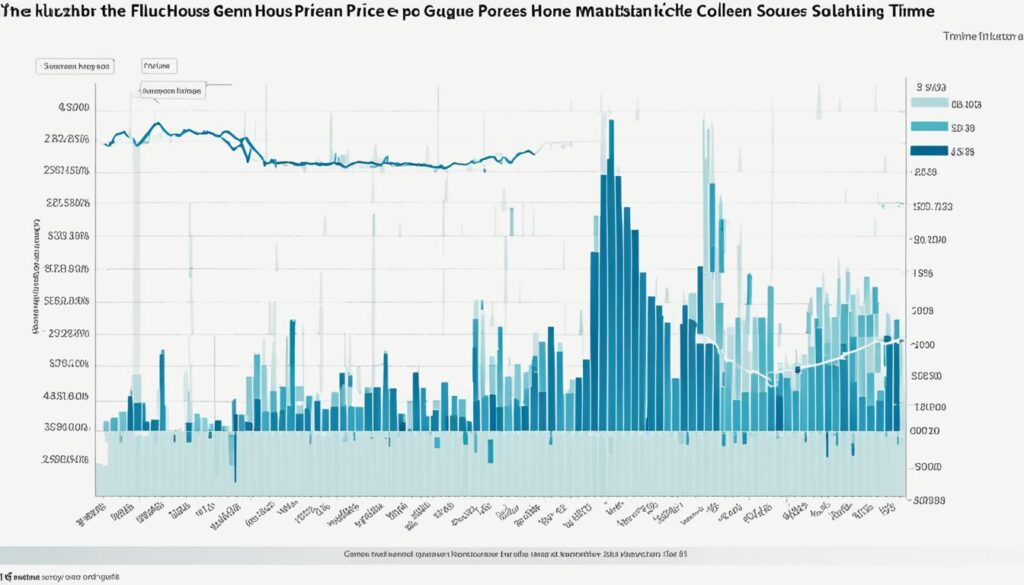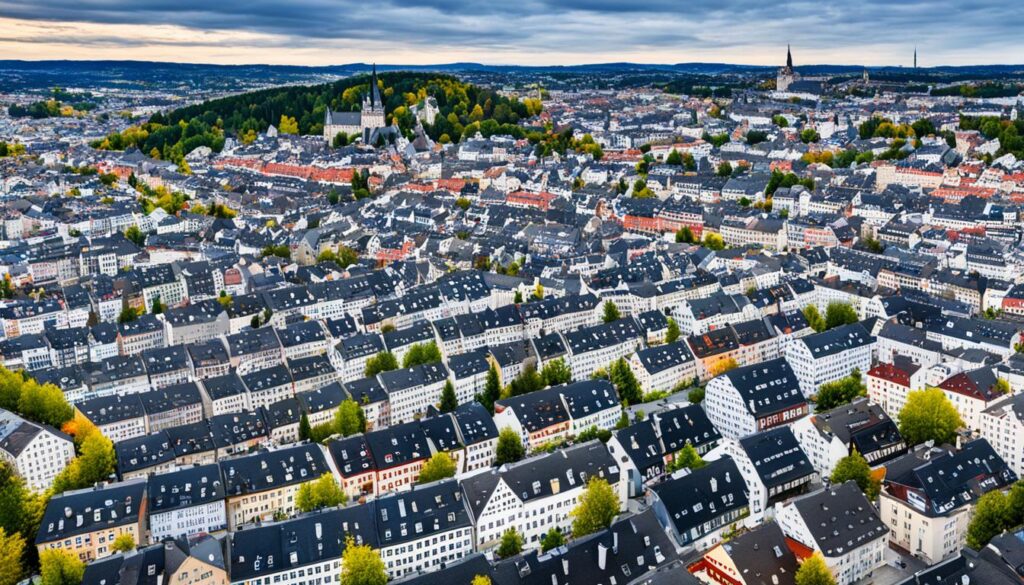The Germany Housing Market has experienced significant changes between 2012 and 2023, witnessing a marked rise in property values nationwide. Factors such as economic stability and robust housing demand have driven this upward trend. Understanding the average house prices per square meter is essential for both investors and potential homeowners as it offers insight into the market’s health and future trajectory.
In 2023, the German house prices showed a downward trend in some areas, with an 8.9% drop for flats, an 11.3% fall for detached houses, and a significant 20.1% decrease for semi-detached homes. Interestingly, prices in cities like Cologne and Stuttgart dropped by 3.6%, making them some of the most affordable cities in terms of price per square meter along with Düsseldorf. Contrarily, house prices in Berlin remained relatively stable with only a 0.4% decrease, whereas Hamburg saw a minor 0.2% increase.
Potential homeowners in Berlin benefit from understanding the specifics of property prices, especially when comparing tenanted apartments, which can be up to 40% cheaper than vacant ones. This disparity is primarily due to the ongoing high demand and limited supply in the city. Despite the robust growth in real estate prices, Berlin remains affordable compared to other significant European cities, attracting significant investments and showing strong population growth. Different districts within Berlin also reflect varied pricing, with the most popular and international areas demanding higher prices and providing lucrative investment opportunities.
Learn more about Berlin’s property pricesand other detailed insights on the Germany Housing Market.
Key Takeaways
- Significant changes in the Germany Housing Market were observed from 2012 to 2023 with rising property values.
- German house prices dropped significantly for various types of homes in 2023.
- House prices in Cologne and Stuttgart fell, making them among the most affordable cities by price per square meter.
- Berlin’s property market remains stable and appealing for investment compared to other major European cities.
- Tenanted apartments in Berlin can be up to 40% cheaper than vacant ones due to high demand.
Introduction to the Germany Housing Market
The German property market is renowned for its complexity and regional diversity. House prices and market conditions can vary significantly from city to city and between urban and rural areas. This diversity makes understanding the housing market dynamics crucial for both owner-occupiers and those considering real estate investment in Germany.
Germany’s housing market is characterized by a high level of stability and reliability, making it an attractive option for both domestic and international investors. Notably, over half of the population in Germany chooses to rent rather than buy properties, which fuels a consistently high demand for rental properties. This demand is especially strong in metropolitan areas and university cities.
Urban areas like Berlin, Hamburg, and Frankfurt are particularly appealing to real estate investors due to the high demand for residential and commercial spaces. The rental market in Germany is bolstered by strong tenant protections and regulated rent increases, alongside a tenant-friendly legal framework that includes strict regulations on eviction and rent hikes.
The German real estate market’s stability is further supported by the country’s robust economy and political stability, positioning it as a safe haven for real estate investors. Germany also offers several tax advantages, such as deductions for property-related expenses and depreciation, which can make real estate investment in Germany even more appealing.
Additionally, the focus on sustainable development and energy efficiency presents numerous opportunities for investing in green buildings and renovations. Future trends in the German real estate market are expected to be shaped by innovation, sustainability, and demographic shifts.
Recent analysessuggest that despite challenges like rising construction material costs and decreased building permits, the market shows resilience with opportunities for growth. Regulatory measures in hotspots like Berlin and Munich have also been introduced to manage the skyrocketing prices in the housing market.
In March 2023, the construction of 24,500 houses was approved in Germany, marking a 29.6% decrease compared to the previous year. The same period saw 68,700 residential building licenses issued, reflecting a 25.7% decrease from the previous year. Despite these challenges, the residential real estate market in Germany is forecasted to grow at a CAGR of over 3.06% from USD 372.77 billion in 2024 to USD 499.84 billion by 2029.
Historical Trends in German House Prices

The trajectory of German home prices over time provides a comprehensive view of the market’s evolution. Over the decades, there has been a discernible pattern of increase and adjustment influenced by various economic factors. The rising house prices have raised numerous discussions around German housing affordability and its implications for new buyers and investors. Let us delve deeper into the critical stages of price development.
Price Development from 2012 to 2023
From 2012 through 2023, Germany experienced a robust growth in house prices with a value increase of approximately 144 percent. This substantial rise underlines the market’s resilience despite occasional dips. For instance, in 2023, real estate prices in Germany dropped by 8.9% for apartments, 11.3% for single-family homes, and 20.1% for multi-family homes compared to the previous year. Such declines reflect market corrections after a prolonged period of significant uptick.
The GREIX real estate price index provides valuable insights into these trends, tracking data points from 1960. The data highlights periods like 1970-1980, where nominal house prices rose approximately 85% against a backdrop of 64% inflation.
Impact of Economic Factors on House Prices
The economic impact on housing is profound, with various factors contributing to the dynamic landscape. Low interest rates, increased housing demand, and growing population density have notably driven property values upward. However, economic stressors such as inflation and policy changes also play pivotal roles. For instance, the inflation-adjusted price changes from 1995 to 2017 showed an extended period of falling prices. Moreover, Deutsche Bank predicts that the end of further interest rate hikes by mid-2023 will potentially halt the current price decline.
| Period | Nominal Price Increase | Inflation Adjustment |
|---|---|---|
| 1970-1980 | 85% | 64% |
| 1995-2017 | Falling Prices | Extended Until 2017 |
| 2012-2023 | 144% | N/A |
Rents have also been an essential determinant for future house prices, profoundly impacted by restrictive rental laws yet shaped by recent inflation and supply shortages. New lease rentals in Q4 2022 grew by 6.5% year-on-year, reaching historical peaks. This rental growth trend provides insights into market future directions, illustrating how renting dynamics intertwine with property value trajectories.
Understanding German home prices over time, along with the economic impact on housing, underscores the multifaceted nature of the market. As we look back on historical trends, these layers of data and economic influences paint a detailed picture of the market’s past and potential future.
Current Average House Prices per Square Meter by Region

The German residential market displays significant disparities in house prices per square meter, particularly between major urban centers and rural regions.
Major Cities versus Rural Areas
In prominent cities such as Berlin, Munich, and Frankfurt, the prices are substantially higher. For instance, Berlin’s average cost for new construction apartments stands at a remarkable 8,530 EUR/m² in 2024. Similarly, Munich remains the most expensive city with an average of 8,400 EUR/m² for existing apartments.
Conversely, rural areas tend to offer more affordable options, making the choice between urban vs rural housing costs pivotal for prospective buyers. For those seeking less expensive properties, cities like Düsseldorf and Cologne offer average prices of 4,500 EUR/m² and 4,700 EUR/m², respectively.
Price Variations Across German Federal States
Regional property values in Germany also exhibit substantial variations influenced by local economic conditions, demand, and housing stock availability. For example:
- Hamburg provides more cost-effective real estate with prices averaging 2,300 EUR/m².
- Frankfurt mirrors the high-end market with apartments costing around 5,800 EUR/m² and houses at approximately 5,100 EUR/m².
- Berlin’s property values have seen notable growth, with the cost of existing properties increasing by 145% over the past twelve years.
For those navigating the real estate landscape, understanding these regional property values and the impact of urban versus rural pricing can provide a strategic advantage. The comprehensive dynamics and variations are detailed further at this detailed report on house prices in.
Factors Influencing House Prices in Germany

Navigating the German housing market requires a deep understanding of the myriad factors influencing house prices. The interplay of economic conditions, interest rates, and government policies shapes the dynamics significantly. Since the 2008 financial crisis, low-interest rates have been pivotal real estate market drivers. The European Central Bank’s decision to lower rates catapulted property prices in cities like Berlin, Munich, and Hamburg. As of post-2008, these cities have exhibited a steady price increase, with Berlin’s property values more than doubling over the past decade.
Understanding the supply and demand in housing reveals much about price fluctuations. High demand in urban areas, coupled with limited housing, drives prices upward. This trend is prominent in major cities, where employment and educational opportunities attract a significant population. Conversely, rural areas, lacking such prospects, often display lower property prices. Urbanization and infrastructure improvements further intensify the real estate price surge.
The German housing crisis has highlighted the critical imbalance between supply and demand in housing. With increasing single-person households and an aging population, the demand for housing outpaces supply. Notably, the robust economic growth and international investments have propelled an unsustainable upward trajectory in house prices.
Moreover, the real estate market drivers such as demographic changes, urban development, and the overall economic outlook remain influential. Real estate prices in Germany have generally experienced a steady climb due to economic stability and low-interest rates. However, fluctuating interest rates and inflation add layers of complexity. For instance, rising inflation prods the European Central Bank to consider rate hikes, potentially cooling market demand and stabilizing prices.
It’s important to consider the role of future trends in shaping housing prices. Current forecasts suggest persistent low-interest rates could maintain the upward momentum in prices, especially in key urban markets like Berlin, Munich, and Frankfurt. However, a potential interest rate hike might decelerate the market, providing a much-needed cooling effect.
For a detailed analysis of the factors influencing house prices in Germany, you can refer to this comprehensive overview.
The Impact of the Germany Housing Crisis on Home Prices
The housing crisis in Germany is profoundly affecting the German apartment market, pushing home prices higher due to supply shortages and surging demand. A significant housing supply deficit has been created due to a combination of factors, including the decreasing number of building permits by almost 27% in 2023 compared to the previous year and a decline in residential construction sentiment hitting an all-time low. Additionally, the rising costs of land, building materials, and acquisition have further strained the market, compelling potential homeowners to seek more affordable options on the city peripheries.
Supply Shortages and Demand Surges
The surge in demand for housing, amid insufficient new constructions, has placed immense pressure on the current housing supply. The need for affordable housing has reached crisis levels, with many families and vulnerable groups struggling to find suitable accommodations. High mortgage interest rates, which increased by nearly 150 basis points between January and July 2022, have further exacerbated the issue, increasing the average housing loan interest rate to 4.3% in November 2023. These economic pressures have deterred many from entering the housing market, causing a 9% decline in housing loans year-on-year in 2022.
The Role of New Construction and Urbanization
Addressing the housing supply deficit requires significant investment in new construction, particularly in urban housing development. Urbanization trends have outpaced the ability of cities to meet housing demand, contributing to rising prices and affordability challenges. While existing property prices have fallen by 14% since their peak in the second quarter of 2022, and new building prices declined by 4.5%, these reductions are insufficient to alleviate the crisis. Therefore, robust policies and funding are necessary to increase construction rates and create a sustainable urban housing infrastructure, ultimately stabilizing prices and easing the market pressure.
FAQ
What is the average house price per square meter in Germany?
The average house price per square meter in Germany varies significantly between regions. As of 2023, in major cities like Berlin, Munich, and Frankfurt, prices can range from EUR 5,000 to EUR 12,000 per square meter, while in rural areas, prices are significantly lower.
How has the German housing market changed from 2012 to 2023?
The German housing market has seen substantial changes from 2012 to 2023, with an overall increase in property values by approximately 144 percent. This growth is largely attributed to economic stability, low interest rates, and increased demand for housing.
What factors contribute to the rising house prices in Germany?
Several factors contribute to rising house prices in Germany, including economic stability, low interest rates, increased demand, population growth, and urbanization trends. Additionally, government policies and construction costs play significant roles.
How do house prices compare between major cities and rural areas in Germany?
House prices in major cities like Berlin, Munich, and Frankfurt are significantly higher compared to rural areas. This is due to higher demand and limited housing supply in urban centers, driving up prices, whereas rural areas generally have more affordable housing options.
What economic factors impact house prices in Germany?
Key economic factors impacting house prices in Germany include low interest rates, economic growth, and demographic changes such as population growth. These factors collectively drive up demand for housing, influencing property values.
Are there significant price variations across different federal states in Germany?
Yes, there are significant price variations across different federal states in Germany. Major urban centers like Berlin, Bavaria (Munich), and Hesse (Frankfurt) tend to have higher property prices, while states with more rural areas generally have lower prices.
What are the main drivers of the German housing crisis?
The main drivers of the German housing crisis include supply shortages and increasing demand. Rapid urbanization has exacerbated these shortages, particularly in major cities, leading to higher home prices and rental costs.
How does new construction impact the German housing market?
New construction plays a crucial role in addressing the housing supply gap in Germany. By increasing the availability of homes, it helps to moderate price increases and offers opportunities for market growth, particularly in urban areas facing high demand.
Source Links
- https://www.iamexpat.de/housing/real-estate-news/german-housing-market-sees-biggest-price-drop-60-years
- https://www.spglobal.com/ratings/en/research/articles/180815-german-housing-market-is-likely-to-withstand-new-regulation-and-rising-rates-10659966
- https://underconstructionpage.com/understanding-the-real-estate-market-in-germany-a-guide-for-everyone/
- https://www.traditiondata.com/news/german-housing-market/
- https://www.mordorintelligence.com/industry-reports/residential-real-estate-market-in-germany
- https://www.dbresearch.com/PROD/RPS_EN-PROD/PROD0000000000526925/German_housing_market:_History_suggests_it_is_an_i.xhtml?rwnode=RPS_EN-PROD$IMMO
- https://www.ifw-kiel.de/publications/news/greix-real-estate-prices-fell-to-an-unprecedented-extent-in-2023/
- https://guthmann.estate/en/market-report/berlin/
- https://www.numbeo.com/cost-of-living/region_prices_by_city?itemId=100®ion=150
- https://realting.com/news/real-estate-in-germany-how-to-buy-and-where-to-invest
- https://kittenproperties.com/blog/article/the-influence-of-interest-rates-on-german-property-prices/
- https://investropa.com/blogs/news/germany-real-estate-market
- https://www.fxstreet.com/analysis/unraveling-the-german-housing-market-inflation-interest-rates-and-the-perfect-storm-202310031021
- https://think.ing.com/articles/what-comes-after-the-german-housing-market-hits-bottom/
- https://www.habitat.org/emea/housing-policy-germany
- https://www.sightline.org/2021/05/27/yes-other-countries-do-housing-better-case-2-germany/
Living in the Germany: A Complete Guide:
- Average Rent in Germany: Current Rates 2024
- Average Salary in Germany: Insights for 2024
- Top Best Places to Live in Germany – Find Yours!
- Understanding Cost of Living in Germany
- Acquire Germany Citizenship: Key Steps & Tips
- Efficient Germany Company Formation Steps
- Unlock Mobility with Germany Golden Visa Program
- Get Your Germany Residence Permit – Easy Steps
- Home Insurance Germany: Secure Your Haven
- Your Guide: How to Move to Germany Easily
- Opening a Bank Account in Germany Made Easy
- Renting in Germany Rules: A Tenant’s Guide
- Navigating School in Germany: A Guide for Parents
- Your Guide to Studying in Germany: Tips & Info
- Understanding Taxes in Germany: A Guide
